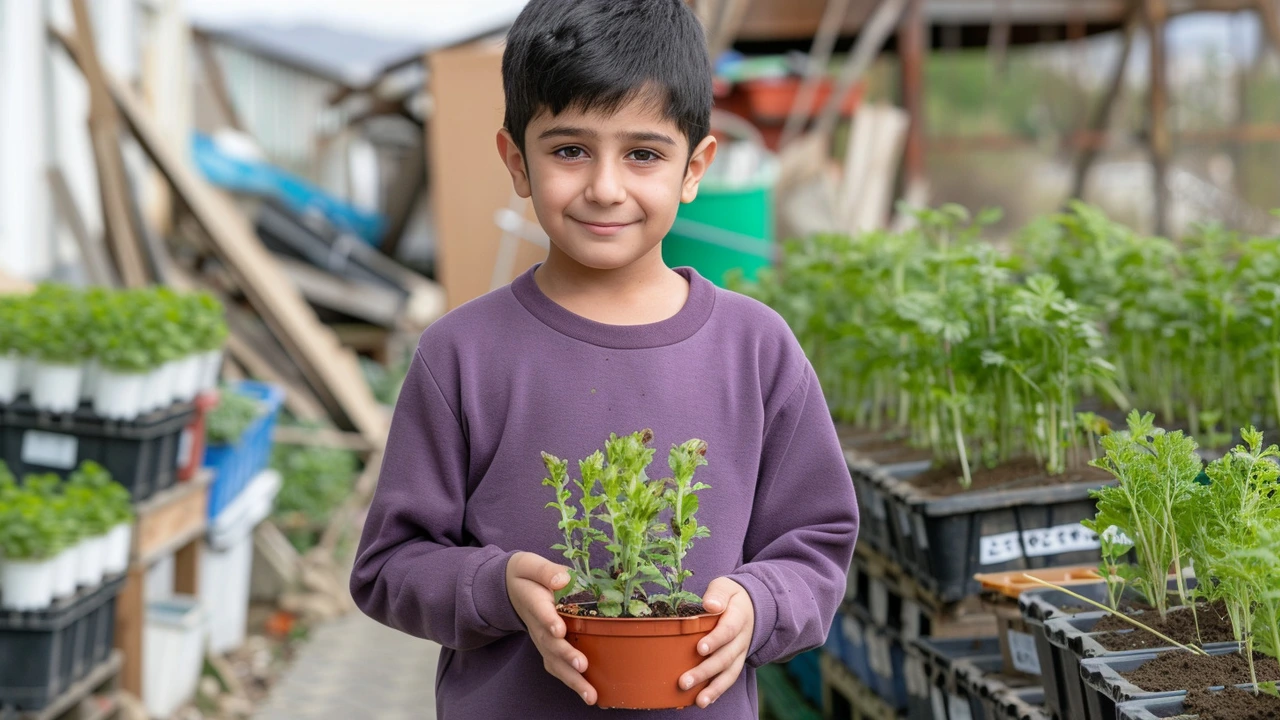 Jun, 5 2024
Jun, 5 2024
World Environment Day 2024: A Call to Restore Our Land
As June 5 approaches, the world gears up to celebrate World Environment Day 2024 with a sharp focus on land restoration, preventing desertification, and building resilience against droughts. The event, spotlighted under the theme 'Our land. Our future. We are #GenerationRestoration,' promises to be a significant touchstone in the fight against environmental degradation. This year, Saudi Arabia has the honor of hosting, an indication of the global collaboration required to address this pressing issue.
UN's Decade on Ecosystem Restoration
The United Nations declared the Decade on Ecosystem Restoration from 2021 to 2030, marking a worldwide initiative to revive billions of hectares of degraded ecosystems. The urgency is palpable—nearly 40% of the world's land is in perilous danger, and the occurrence of droughts has surged by 29% since the start of the 21st century. The stakes are alarmingly high, as failure to act could see three-quarters of the global population affected by degraded land by mid-century.
This systemic loss is catastrophic, posing severe threats to our food supplies, accelerating climate change, and precipitating a grave loss of biodiversity. The commitment to restoring one billion hectares of land is not just an environmental need—it's a socio-economic necessity. The Decade on Ecosystem Restoration identifies key sites including forests, agricultural lands, rivers, oceans, cities, and peatlands. This vast spectrum underscores the comprehensive efforts needed to rejuvenate Mother Earth.
The Role of Host Nation Saudi Arabia
Saudi Arabia's role as this year’s host brings attention to its ambitious environmental goals. This nation, traditionally known for its vast deserts, is embarking on numerous projects aimed at combating land degradation. The Saudi Green Initiative is one such venture, aiming to plant billions of trees within its borders and across the region, addressing both carbon emissions and the harsh impacts of climate change.

The Impact of Degraded Land
Land degradation has more profound consequences than merely aesthetic changes. It undermines the soil's fertility, leading to lower agricultural productivity, which in turn jeopardizes food security. The stress on food systems is particularly concerning as the global population continues to swell. Without fertile land, sustainable agriculture becomes a mirage, aggravating hunger and poverty.
Moreover, degraded land exacerbates climate change. Healthy ecosystems such as forests and peatlands are essential carbon sinks; their degradation means releasing carbon back into the atmosphere, intensifying the greenhouse effect. But the ripple effects don't stop there. Biodiversity loss is a direct result of habitat degradation, erasing countless species and disrupting ecosystems that humans rely upon.
Initiatives Across the Globe
Counties worldwide have pledged to restore degraded lands as part of their contribution to the Decade on Ecosystem Restoration. Among the many inspiring examples is Nepal, which has seen success in its conservation efforts with the tripling of its tiger population. Such stories highlight how dedicated restoration programs can yield tangible and significant results.
Practical Steps for Individuals
While government policies and large-scale projects are critical, individual actions play a vital role in this colossal effort. Simple, everyday actions such as planting trees, practicing recycling, and conserving water can collectively make a substantial difference. Organizing local tree-planting events, reducing plastic use, and promoting sustainable practices are tangible ways to contribute.
Sustainable agriculture is a key area needing attention. Purchasing organic produce, participating in or supporting composting initiatives, and reducing food waste are practices that, if widely adopted, can significantly support land restoration efforts. Freshwater ecosystems, often overlooked, are equally important. Reducing water consumption and curbing pollution can protect these vital life sources, ensuring they continue to nourish both people and wildlife.

Celebrating Milestones
This year also marks the 30th anniversary of the United Nations Convention to Combat Desertification (UNCCD). Over three decades, the UNCCD has been at the forefront of global efforts to fight land degradation. Its initiatives and policies have been pivotal in guiding countries towards sustainable land management practices. The convention continues to adapt and innovate, integrating new scientific findings and technologies to address the evolving challenges of land degradation and desertification.
Promising Path Ahead
Despite the daunting statistics and challenges, there's room for optimism. The global commitment to the Decade on Ecosystem Restoration signals a unified resolve to address environmental crises. The collective actions of nations, organizations, and individuals can indeed turn the tide. As Saudi Arabia and the global community rally around World Environment Day 2024, the message is clear: it’s time to restore our land, secure our future, and stand as #GenerationRestoration.

ashli john
June 5, 2024 AT 18:13We can all pitch in plant a tree or two and watch our community thrive.
Kim Chase
June 5, 2024 AT 18:46It’s defiantly a chance for each of us to do sumtin real, and teh impact spreads far beyond just a few saplings.
David Werner
June 5, 2024 AT 19:20Imagine a world where shadowy elites profit from barren soil, while we sit idle as our children inherit deserts; the very air we breathe is laced with hidden agendas that choke the planet's heartbeat.
Paul KEIL
June 5, 2024 AT 19:53Strategic land‑use reallocation via agro‑ecological buffers enhances carbon sequestration efficiency.
Horace Wormely
June 5, 2024 AT 20:26The restoration of degraded ecosystems must be guided by robust scientific methodologies and continuous monitoring to ensure measurable outcomes.
christine mae cotejo
June 5, 2024 AT 21:00The urgency of land restoration cannot be overstated, as each hectare of degraded soil represents a lost opportunity for food security.
Restoring native vegetation revitalizes soil microbiomes, which are essential for nutrient cycling.
Community-led tree planting not only sequesters carbon but also restores cultural ties to the land.
Policy frameworks should incentivize regenerative agriculture, shifting subsidies from monoculture to diverse crop systems.
Water retention improves dramatically when organic matter is reintroduced, reducing the severity of droughts.
Biodiversity rebounds when habitat corridors are reestablished, allowing wildlife to migrate safely.
Educational programs that involve schools create a generation that values stewardship over exploitation.
Financial mechanisms such as green bonds can fund large‑scale restoration projects without overburdening taxpayers.
The involvement of indigenous knowledge offers time‑tested practices that modern science is only beginning to validate.
Monitoring technologies like satellite imagery provide real‑time data to track progress and adapt strategies.
Success stories from Nepal’s tiger population surge illustrate the tangible benefits of sustained conservation efforts.
Urban greening initiatives mitigate heat islands and improve air quality for city dwellers.
Restored peatlands act as massive carbon sinks, preventing the release of centuries‑old stored carbon.
Collaborative international platforms ensure that best practices are shared and scaled globally.
Ultimately, a collective commitment to restore our land will secure a resilient future for all inhabitants of Earth.
Douglas Gnesda
June 5, 2024 AT 21:33Building on that, integrating AI‑driven predictive models can pinpoint degradation hotspots before they become irreversible, allowing pre‑emptive interventions.
Abhijit Pimpale
June 5, 2024 AT 22:06Precision mapping reduces resource waste and accelerates impact.
Eric DE FONDAUMIERE
June 5, 2024 AT 22:40Yo let's get out there plant some trees ASAP, we got this!
Pauline Herrin
June 5, 2024 AT 23:13While the enthusiasm is evident, it is imperative to assess the feasibility of such large‑scale initiatives within existing fiscal constraints.
pradeep kumar
June 5, 2024 AT 23:46The budgetary implications are non‑trivial yet can be offset by long‑term ecosystem service valuation.
love monster
June 6, 2024 AT 00:20Engaging stakeholders through participatory workshops fosters ownership and drives measurable outcomes in restoration projects.
Christian Barthelt
June 6, 2024 AT 00:53However, over‑reliance on community volunteers may compromise project consistency and data integrity.
Ify Okocha
June 6, 2024 AT 01:26The narrative conveniently glosses over the geopolitical power plays that dictate resource allocation, masking ulterior motives.
William Anderson
June 6, 2024 AT 02:00Enough talk-if we don’t act, the planet will turn into a barren wasteland, a bleak future nobody wants.
Sherri Gassaway
June 6, 2024 AT 02:33Perhaps the true restoration begins within our minds, reshaping perception before ever touching the soil.